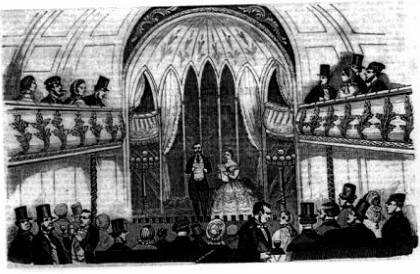


|
The Lissenden Players |
|
Traditional Music Hall Entertainment |

|
The Halls - A brief History |
By Terry Lomas |

|
Telephone 020 8674 0526 |
|
The origins of “The Halls” can be traced to the taverns, song and supper rooms, pleasure gardens and penny gaffs of the early 19th century. The 1843 Theatres Act provided the opportunity for saloon theatres to become either legitimate theatres with a dramatic licence from the Lord Chamberlain, but without being able to sell alcohol in the auditorium, or becoming tavern concert rooms with a licence to serve drinks but being prohibited from producing plays. Charles Morton, later to be known as “The Father of the Halls” acquired the Canterbury Arms, located in Upper Marsh, Lambeth, in 1849, and he provided entertainment as well as refreshment, originally for men only, but the enterprise became so popular that ladies were admitted on Thursdays. Morton was so successful that he decided to build a hall with a capacity of seven hundred on the land at the back of the tavern, on which land stood a skittle alley. The hall opened in 1852 with performances every evening with ladies admitted to all performances instead of only on special “ladies” nights. It was not long before Morton had to rebuild the Canterbury Hall owing to the phenomenal success and the new Canterbury Hall opened in 1856 with a capacity of 1500. Other new halls were built in London. The Mogul Saloon became the Middlesex Music Hall in 1851, Wilton’s in Whitechapel opened in 1858, the South London in 1860, the Bedford in Camden Town in 1861 and Collins, Islington, in 1862. The first West End Hall (1861) was the Oxford, opened by Morton at the junction of Tottenham Court Road and Oxford Street on the site of the Boar and Castle Inn. Great stars of this era were Sam Collins, Jenny Hill, George Leybourne (“Champagne Charlie”), Nelly Power and the Great Vance. Provincial cities were soon to follow trends in London and the “The Era Almanac” listed 300 halls outside London in the 1870s. However, many of the halls were poorly constructed and a series of fires led to legislation requiring all buildings to obtain a Certificate of Suitability from 1876. Many owners could not afford the necessary alterations. Some owners re-built their premises and soon investors and syndicates became interested in the financial rewards in running music halls— or variety theatres as they became known. The traditional chairman was dispensed with in the 1880s, his duties being taken over by an electronic numbers board by the side of the proscenium which corresponded with those in the printed programme. Theatre style seating replaced tables and chairs, and in due course the sale of alcohol in the auditorium was prohibited. Big business had taken over from the individual proprietors and the very nature of music hall changed and was now subject to ever-increasing legislation and became more socially acceptable. The so-called “Golden Age” lasted until the outbreak of the first world war in 1914 and Marie Lloyd, Dan Leno, Harry Lauder, Vesta Tilley, Little Tich and George Robey became great stars. The influences of revue and cinema led to a gradual decline in popularity of variety during the 1920s and 1930s, although the period did produce more stars such as Gracie Fields, George Formby, Max Miller and ‘The Crazy Gang’. The tremendous impact of television in the mid 1950s led to the closure of many variety theatres and the art form was presented on television by “The Good Old Days” from 1953 to 1983. The Players Theatre, founded in 1936, presented music hall at two theatres located in the arches under Charing Cross station until its sad demise in 2002. Today, stars such as Ken Dodd, Roy Hudd and Joe Pasquale continue the tradition. The British Music Hall Society was formed in 1963 to ensure that the importance of music hall and variety in the development of popular entertainment is not forgotten, and there are still amateur and professional drama groups which specialise in performing music hall, including The Lissenden Players based in Highgate in North London.
|
